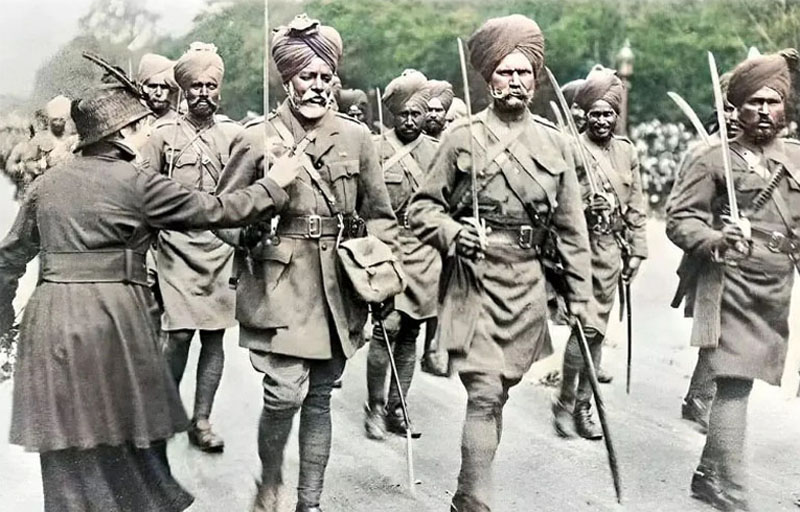 Paris
Paris
Indian soldiers to march in Paris again after 107 years; glorious return for Punjab regiment
In a remarkable turn of events, soldiers from the Punjab Regiment are set to march in Paris, marking a historic moment after 107 years. This significant event, reminiscent of the past, highlights the enduring ties between India and France.
The absence of Indian soldiers in the 2017 Hollywood film “Dunkirk” caused disappointment among Indians, particularly those with an interest in military history. The film, based on the Battle of France and the evacuation of Allied soldiers from Dunkirk during World War II, failed to acknowledge the role of Indian soldiers from the British Indian Army in both World Wars.
Despite the oversight by Western media, an iconic black-and-white photograph emerged during the release of “Dunkirk,” capturing a French woman pinning a flower on a Sikh (Indian) soldier. This image, dating back to the First World War, symbolizes the contribution of Indian soldiers, possibly from the Sikh Regiment, in saving France from German occupation in 1916.
Now, more than a century later, history comes full circle as soldiers from the Punjab Regiment, now part of the Indian Army, prepare to embark on a journey to France. They will participate in the Bastille Day parade in Paris, scheduled to take place on July 14. This year’s parade holds even greater significance as Indian Prime Minister Narendra Modi has been invited as the Guest of Honour on the French National Day.
Colonel Sudhir Chamoli, spokesperson for the Indian Army, announced, “The Bastille Day parade will feature a 269-member tri-services contingent from the Indian Armed Forces marching alongside their French counterparts. The contingent has departed for France today.”
The Indian soldiers arrive in France amidst a backdrop of unrest, with Paris and other cities experiencing week-long riots and arson. However, this visit serves as a testament to the enduring bond between the Indian and French armies, dating back to World War I.
During the First World War, over 1.3 million Indian soldiers participated, with nearly 74,000 losing their lives and 67,000 sustaining injuries. Notably, Indian troops demonstrated their bravery and made significant contributions to the war effort on French soil. Their valor and sacrifices played a crucial role in securing victory against the enemy.
Representing the Indian Army in Paris is the Punjab Regiment, one of the oldest regiments in the Indian Army. The regiment has participated in both World Wars and various post-independence operations. In World War I, the Punjab Regiment received 18 Battle and Theatre Honours, fighting in locations such as Mesopotamia, Gallipoli, Palestine, Egypt, China, Hongkong, Damascus, and France. Their involvement in France included an offensive near Neuve Chapelle in September 1915, earning them the Battle Honours “Loos” and “France and Flanders.”
During World War II, a staggering 2.5 million Indian soldiers made notable contributions in various theatres of the war, including France. The Punjab Regiment, among others, earned 16 Battle Honours and 14 Theatre Honours, solidifying their reputation as valiant fighters.
This year’s Bastille Day parade marks the 25th anniversary of the “Strategic Partnership” between India and France. Both nations have engaged in joint military exercises and shared valuable experiences over the years.
Accompanying the Indian contingent is the Rajputana Rifles Regiment Band, representing the seniormost rifle regiment of the Indian Army. The Rajput Regiment has a long and illustrious history, having participated in numerous battles across the world. Their contributions during World War II were particularly notable, and they were awarded six Victoria Crosses prior to India’s independence. The regiment’s band was established in 1920 in Nasirabad, Rajasthan, during the British era.
Led by Captain Aman Jagtap, the Indian Army contingent comprises 77 marching personnel and 38 band members. Commander Vrat Baghel leads the Indian Navy contingent, while Squadron Leader Sindhu Reddy leads the Indian Air Force contingent.
As the wheel of history turns once more, Indian soldiers proudly march through the streets of Paris, representing a legacy of courage, valor, and shared sacrifices. The participation of the Punjab Regiment in the Bastille Day parade serves as a powerful symbol of the enduring friendship between India and France, rooted in their shared military history.
(Image and text credit: Khalsavox.com)
Support Our Journalism
We cannot do without you.. your contribution supports unbiased journalism
IBNS is not driven by any ism- not wokeism, not racism, not skewed secularism, not hyper right-wing or left liberal ideals, nor by any hardline religious beliefs or hyper nationalism. We want to serve you good old objective news, as they are. We do not judge or preach. We let people decide for themselves. We only try to present factual and well-sourced news.







